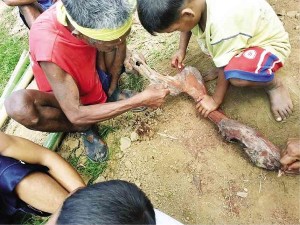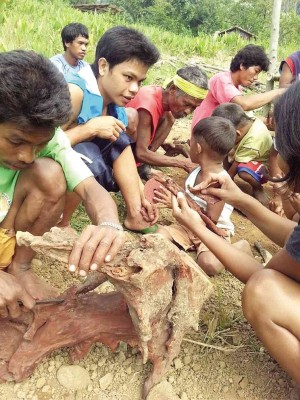Dumagat sky is sea of images

A DUMAGAT child helps an elder prepare driftwood for wood sculpting. PHOTOS BY DARWIN FANDINO FLORES/CONTRIBUTOR
In the far-off village of Tayabasan in Antipolo City’s Barangay San Jose are images as far as the eye can see. “What do you see?”
Darwin Flores asked a community of Dumagat people when his team first came to the village last month to teach wood sculpting.
Flores is the head of the community partnership department of Smart Communications Inc. and represents the private sector in the Philippine Disaster Recovery Foundation, which works for the preservation of the Marikina Watershed.
“Ulupong,” yelled a man from the crowd like a proud student to his teacher.
How the man imagined a cobra out of an oddly shaped piece of driftwood, many may not know.
Article continues after this advertisement“They draw it from their experiences,” Flores said. “Look at the sky around you, then look at the piece of wood and decide what you want to do with it.”
Article continues after this advertisementSmart, in partnership with Daambakal, a group formed by Filipino sculptor Rey Paz Contreras in Tondo, Manila, has been training communities on wood sculpting as an alternative means of livelihood.
After a big flood ravaged General Nakar town in northern Quezon in 2004, the group trained people in the fishing village of Banglos after losing their livelihood to mudslides that ruined the coral reefs.
For almost a decade now, the Banglos sculptors have exhibited and sold their works, mostly bangus (milkfish) art sculptures.
The success of the program prompted a reechoing in Tayabasan inside the 28,000-hectare Marikina Watershed, as well as in Ipo Watershed, both major sources of water in Metro Manila.
Flores said his group aimed to discourage charcoal making, slash-and-burn farming, and small-scale gold panning—the common practices of the Dumagat—by introducing a new skill that would not harm the environment.
On their training day on Sept. 4, members of the tribe were asked to bring forest debris and driftwood that they found scattered in the forest.
“Do not cut down trees,” cautioned Daambakal member Romeo Factor, “as fresh wood do not make for a good sculpting material, anyway.”
Unlike in Banglos where there is electricity, the Dumagat people were taught to use manual carving tools. After about half a day of polishing and varnishing: a boar’s head, a serpent and flowers were carved into home and wall decor items.
“More than what they could earn is the pride it may bring these people,” Flores said.

MEMBERS of a Dumagat community learn the art of wood carving as a potential alternative means of livelihood in Sitio Tayabasan, Barangay San Jose, Antipolo City.
Art exhibits
The Banglos sculptors, he said, had already gained a following after several art exhibits, including once at the Cultural Center of the Philippines.
Smart is also willing to support the Tayabasan community promote and sell their works, Flores said.
Local leader Rogelio Cruz said his people were willing to give sculpting a try since charcoal making and gold panning had not been giving them steady income.
“If no one wants to buy them, then we will just use them as firewood for cooking,” resident Policarpio Vertudez quipped.
After seeing their works, Flores said he was confident of the Dumagat, whose edge from other craftsmen “is their way of looking at things that make their works very unique.”
“We are not even going to sell their works based on (people’s) pity, but on the merits of their craft,” he said.